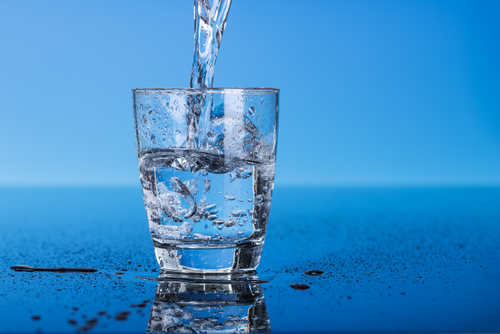CLAIM #4: Drinking Water Boosts Your Metabolism
 Thursday, February 8, 2018 at 5:19AM
Thursday, February 8, 2018 at 5:19AM  This is entry #4 in a 9-part series on Metabolic Myths.
This is entry #4 in a 9-part series on Metabolic Myths.
Metabolism-boosting hype generally has a grain of truth behind it that has been way overblown. In other cases, long disproved theories continue to be touted because they are super effective as click-bait (or selling books). You rarely see any actual numbers -- how many calories per day will this raise my resting metabolic rate? -- attached to claims. That’s because for the most part the actual increase (if any) in resting metabolic rate (or other components of your daily total energy expenditure), is too small to be of any practical significance.
Metabolism mythology has a life of its own though as it gets regurgitated and reposted throughout the internet and fad-diet books (and unfortunately even by many otherwise reputable sources).
Review "Metabolism" here: Metabolic Rate
My last topics were eating more frequently, muscle and breakfast, today's topic is water:
CLAIM: drinking water (or especially cold water) increases your metabolic rate.
Three semi-recent studies reported that drinking cold water increased metabolic rate by 24- to 30%.i ii iii These studies involved 500-ml (16.9-oz.) of cold water, and the increase in metabolic rate after drinking lasted about 60 minutes.
The author of one of these papersii concluded that, drinking 2 liters (67-oz.) of water per day would augment resting energy expenditure (REE) by approximately 95-calories.
Stunned by these extraordinary results (compared to data from previous studies), several researchers set up their own new studies. Brown (2006)iv found that cold water increased REE by only about 5%, while room temperature water had no effect. Girona (2014)v tested the metabolic response to drinking cold, room temperature, and body-temperature water. Cold and room temperature water increased REE by 2.9% and 2.3% over 90 mins. And most recently, Charriere (2015)vi tested drinking (room temperature) water against “sham drinking” (raising a glass of water to the lips pretending to drink, but not drinking). The water drinking led to a marginal (2.7%) increase in REE, but the result was not a statistically significant difference from the response to sham drinking (1.5%).
In summary, the vast majority of studies have found a tiny (if any) increase in REE from water drinking (0- to <5%).iv vi vii Furthermore, the non-significant differences found between drinking cold, or room-temperature water, and “sham-drinking” (pretending to drink the glass of water), calls into question whether water-drinking itself is actually even the variable affecting REE.vi
Just for fun, let's shift to considering the tiny bump in REE that some studies showed. What is the most that bump in REE could add up to?
For 40-year-old, 166-lb. female with an average REE (1,421-kcals) a 5% increase in REE (that lasts for 60-minutes), adds up to just 1.75-calories.
Remember this is for drinking 500 ml (16.9-oz.) of water. For 2 liters of water the bump would add up to 7-calories, which is equivalent to a scant half-teaspoon of sugar.
So while technically it might be argued that drinking water can increase REE, in fact—once again—we have a metabolic myth that has no practical significance.
In closing it's important to note that there's absolutely nothing that's healthier for you to drink, than water. As I've written about before (Is what you're drinking helping...), most people don't drink enough water, and should choose their beverages more carefully.
If you read this far and wondered why I didn't touch on the purported "fat-burning" effects of water it's just because this blog is already too long! I have it on my calendar for 2018 though, so check back from time to time.
All the Best!
Dorene
Related articles:
Is what you're drinking helping or hindering your weight loss efforts?
Media Fail: Busting the water "Myth"
References:
[i] Influence of water drinking on resting energy expenditure in overweight children. Dubnov-Raz, et al. Intl J Obes 2011;35(10):1295-1300.
[ii] Water-induced thermogenesis. Boschmann, et al. J Clin Endocrinol Metab 2003;88(12):6015-9.
[iii] Water Drinking Induces Thermogenesis through Osmosensitive Mechanisms. Boschmann, et al. J Clin Endocrinol Metab 2007;92(8):3334-3337.
[iv] Water-Induced Thermogenesis Reconsidered: The Effects of Osmolality and Water Temperature on Energy Expenditure after Drinking. Brown, et al. J Clin endocrinol Metab 2006;91:2598-3602.
[v] Cardiovascular and metabolic responses to tap water ingestion in young humans: does the water temperature matter? Girona, et al. Acta Physiologica 2014;211(2):358-370.
[vi] Water-induced thermogenesis and fat oxidation: a reassessment. Charriere, et al. Nutr Diabetes 2015;5:e190.
[vii] Negative, Null and Beneficial Effects of Drinking Water on Energy Intake, Energy Expenditure, Fat Oxidation and Weight Change in Randomized Trials: A Qualitative Review. Stookey, JD. Nutrients 2016;8(1):19.





